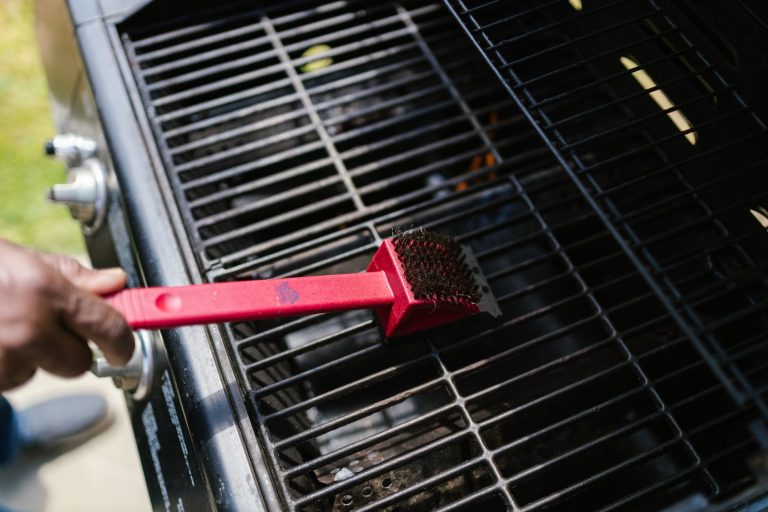Keeping your grill clean is more than a chore; it’s the cornerstone of the grilling experience. As many culinary enthusiasts know, the sizzle of meat, the intoxicating aroma of smoke, and the delightful flavors all hinge on a well-maintained grill. Grilling is not just a method of cooking; it’s a cherished ritual that brings people together.
The Health Implications of a Dirty Grill
Bacteria and Mold Growth: Leftover grease and food particles can transform your grill into a haven for bacteria and mold. While the high heat may kill some of these microorganisms, only a thorough cleaning can ensure a germ-free cooking surface. As Chef Sedesh Boodram from Birmingham, Alabama, emphasizes, proper cleaning is the only way to eliminate these harmful agents.
Carcinogens on Your Grill: Grilling red meat has its joys, but the black residue left behind on your grates can be a health concern. When meat fat incinerates, it can produce carcinogens. These harmful compounds can latch onto your food in subsequent grilling sessions, posing potential health risks.
Fire Hazards: An unclean grill is a ticking time bomb. Layers of grease can lead to unexpected flare-ups, endangering you and potentially causing irreparable damage to your grill and surroundings.
Taste and Quality of Food
Unwanted Flavors: A grill layered with old grease and burnt marinade can sabotage your culinary efforts. Instead of the desired smoky essence, you might end up with a meal that tastes bitter or rancid.
Uneven Cooking: Grime and residue can hinder your grill’s efficiency. It can struggle to reach and sustain the right temperature, resulting in food that’s unevenly cooked – overdone in some parts and raw in others.
Cleaning Techniques for Different Grills
Regular cleaning not only ensures optimal performance but also extends the life of your grill. By preventing rust and wear, you can ensure your grill remains in top condition for years.
Gas Grills: For gas grills, start by disconnecting the propane tank. Remove the grates and flavorizer bars, soaking them in a mixture of warm water and dish soap. Scrub the burners and ensure the gas ports are open. Clean the inside walls with a grill brush. Lastly, wipe down the exterior with a damp cloth.
Charcoal Grills: Empty the grill and brush away any ash residue. Like with gas grills, soak the grates in soapy water, scrubbing away any stubborn grime. Clean the inside with a brush and wipe down the exterior.
Electric Grills: Ensure the grill is unplugged. Remove the grates and any other removable parts, cleaning them with soapy water. Wipe the heating element with a damp cloth, being careful not to immerse it in water.
There are also environmental implications. A dirty grill consumes more fuel as it struggles to reach the desired temperature, leading to higher energy consumption. Moreover, improperly disposed of grease can seep into the ground, contaminating surrounding water sources.
10 Tips for Maintaining a Clean Grill
By following these tips, you can ensure that your grill remains in top condition, ready to deliver delicious meals every time you fire it up!
- Post-Cooking Clean-Up: After each grilling session, while the grill is still warm (not hot), use a grill brush like one of the Top 5 Grill Brushes on Amazon, to scrub off any food particles and residues. This makes it easier to remove them compared to when the grill has cooled down completely.
- Regularly Check for Grease Build-Up: Grease trays or catch pans should be checked and cleaned regularly. Accumulated grease can become a fire hazard and also attract pests.
- Use Grill Covers: Protect your grill from the elements by using a grill cover. This prevents dust, debris, and moisture from getting to your grill, reducing the chances of rust and wear.
- Deep Clean Seasonally: At least once or twice a year, give your grill a thorough cleaning. This includes taking out removable parts, soaking them, and cleaning the interior and exterior of the grill.
- Inspect for Rust: Regularly inspect your grill for signs of rust, especially if it’s stored outdoors. If you spot any, clean it off and consider using a rust-resistant spray.
- Oil the Grates: Before grilling, lightly oil the grates using a paper towel dipped in cooking oil. This not only prevents food from sticking but also protects the grates from moisture which can lead to rust.
- Empty the Ash Catcher: If you have a charcoal grill, ensure that you empty the ash catcher regularly. Ash can trap moisture, leading to corrosion and affecting the grill’s performance.
- Check for Propane Leaks: For gas grills, regularly check for propane leaks. This can be done by applying a soap-water solution to the gas line and connections. Bubbles forming indicate a leak.
- Rotate Grates and Burners: Periodically rotate your grates and burners if you have a multi-burner grill. This ensures even wear and tear, prolonging their lifespan.
- Store in a Dry Place: If possible, store your grill in a dry place, like a shed or garage, especially during rainy seasons or winter. This reduces exposure to moisture, which is the primary cause of rust.
Conclusion
Keeping your grill clean is essential for any BBQ enthusiast. It’s not just about aesthetics or prolonging the life of your equipment. A clean grill is the foundation of a successful BBQ, ensuring the health and safety of those enjoying the food and guaranteeing that your dishes are flavorful and perfectly cooked. So, as you prepare for your next BBQ session, remember the manifold benefits of a pristine grill. Your efforts will be rewarded with delicious results and the peace of mind that comes with safe, clean cooking.

